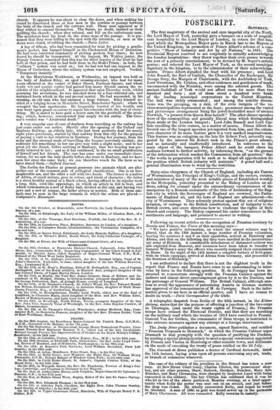POSTSCRIPT.
• SATURDAY.
The first magistrate of the ancient and once imperial city of the North, the Lord Mayor of York, yesterday gave a banquet on a scale of magnifi- cent hospitality to the Lord Mayor of London, in return for that ban. quet which the Metropolitan Mayor gave in March last to the Mayors of the United Kingdom, in promotion of Prince Albert's scheme of a com- petitive " Show of Industry and Art by all Nations," in 1861. The Provincial Mayors resolved to act conjointly in suitably acknowledging the London hospitalities: they threw together their civic purses towards the cost of a princely entertainment, to be devised by M. Soyer's artistic genius; and selected the Lord Mayor of York, as the second municipal dignitary in the kingdom, to be the administrator of their acknowledge- ments. Prince Albert dignified the feast with his presence ; and Lord John Russell, the Earl of Carlisle, the Chancellor of the Exchequer, Sir George Grey, the Marquis of Clanricarde, with the Archbishop of York, Lord Overstone, Mr. Cobden, and other noblemen and gentlemen of mark, unconnected with the Ministry, were among the selected guests. The ancient Guildhall of York would not afford room for more than two hundred and forty ; and of these about a hundred were heads of the leading municipal corporations in the United Kingdom. The hall was richly ornamented ; and among the notable decora- tions was the grouping, on a dais, of the civic insignia of the va- riousraunieipalities represented at the feast; prominent among the 'varied and picturesque arrangement being the jewel-bestudded mace of ancient Norwich, " a present from Queen Bess herself." The after-dinner speeches were of the cosmopolitan and genially liberal tone which distinguished those made at the London banquet ; Lord John Russell and Lord Car- lisle excelling the civic orators, as a matter of course. Prince Albert de- livered one of the longest speeches yet reported from him, and the extem- pore character of its main feature gave it a very marked impressiveness. This feature was an eulogium on the late Sir Robert Peel, naturally sug- gested by the interest Sir Robert took in the Prince's great scheme, and as naturally and unaffectedly introduced. In reference to the main object of the banquet, Prince Albert said he could cheer his auditors forward to farther activity, by informing them, "on the ground of the information which reaches the Commission from all quarters," that "the works in preparation will be such as to dispel all apprehension for the position which British industry will maintain.' A grand ball and a general illumination were to wind up the festivities.


























 Previous page
Previous page